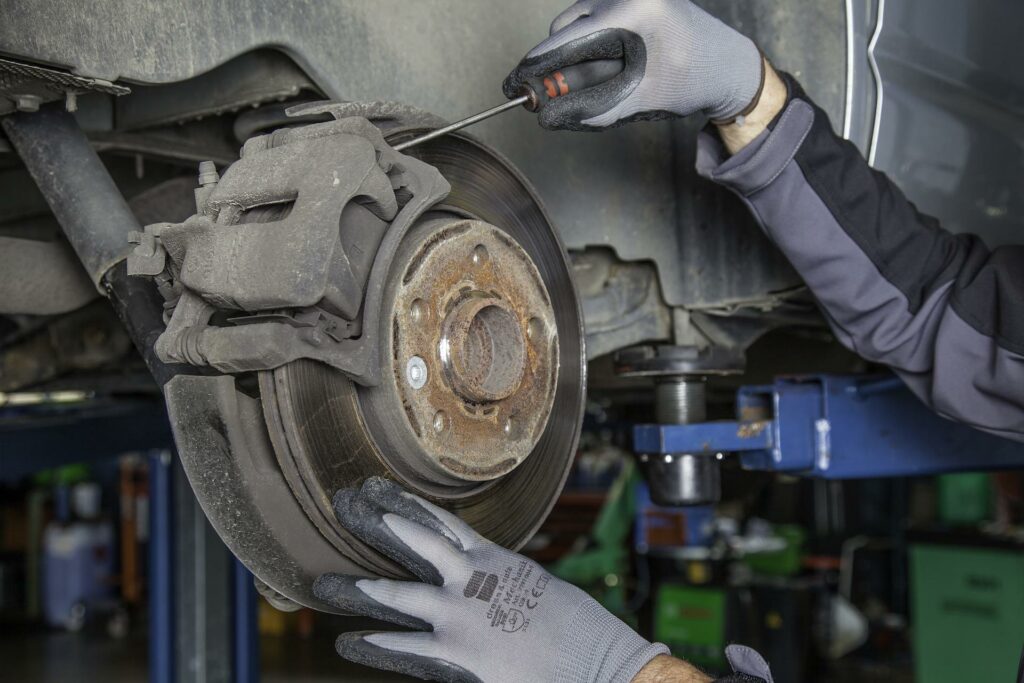
Brakes are an essential part of any vehicle but as motorists, we often take them for granted. Only when brakes underperform, or fail to do their job entirely, do we consider the important role they play in our safety. Every time you hit the brake pedal a complex system comes into play in order to stop the car. Here’s what happens:
The Technical Bit
The brake pedal is a connected to a lever which pushes a piston into the master cylinder. The master cylinder is filled with hydraulic fluid and this fluid courses through the pipes in the system to the brake calipers.
Another cylinder attached to each caliper multiplies the force of your foot so that the pressure applied to each brake is enough to stop the car. The calipers engage each brake pad on the brake discs and you come to swift and safe stop.
The Science Bit
A braking system converts kinetic energy (forward momentum) into heat, using friction. Friction is generated when the brake pads contact the alloy discs connected to the wheel hubs.
A brake pad must therefore withstand high temperatures and friction between the pad and the disc. Brake pads are made of compounds including metal shavings of brass, steel and copper all held together using resin.
Eventually brake pads wear down due to friction and must be replaced for the brakes to continue being effective and safe.
How to know when your brake pads need changing
- Squealing noises
If you press the brake pedal and hear a squealing, grating or scraping noise this often means your brake pads have worn down to their ‘wear indicator’. Rather than a visual wear indicator, many modern brake pads use an auditory wear indicator which is a metal tab inserted part way through the brake pad which engages with the disc once it has worn sufficiently. It’s time to replace the offending brake pads if you hear this noise. - Clicking noises
Various models of brake pad are held in place with clips, bolts or a variation of these components. If these become damaged you may hear a clicking noise as the pad isn’t held firmly in place. It is imperative to have your brakes checked in this instance. - Delayed braking response
A delayed response in braking, where it takes longer to stop than it used to, is known as ‘brake fade’. This is common when a car owner lives in a hilly area and must apply the brakes over a long period of time without bringing the car to a complete stop. Having to do so causes the pads and discs to heat up often and will diminish their performance quicker. As a result, your car won’t stop in the same distance that it once did. - Car pulling to one side under braking
Occasionally, brake pads will wear at quicker rates on one side of the car. This will cause the brakes to pull the car to one side under braking. Have this looked at immediately, because the resultant cost to a damaged steering rack, ball joints, steering knuckles and wheel bearings is far more than replacing the brake pads in a timely manner. - Vibrating brake pedal under load
If the issue isn’t directly related to your brake pedal adjustment, then a vibrating pedal could be caused by ‘glazing’. Glazing is an issue with the brake pad resin. Typically, the brake pads heat up and as they wear cause a film of resin to form on the discs. If the pads overheat, the resin may be distributed unevenly and may be causing the vibrating. Have this problem checked by a professional immediately.
Oaks Services offer experienced and knowledgeable automotive repairs and services at our dedicated MOT testing station in Chertsey. For any repairs to your car, van or motorhome, we are sure to diagnose the problem, provide parts from leading brands and fix the car so it’s ready for thousands of miles to come. We have years of experience solving braking issues and are proud to keep all vehicles safe and roadworthy. Contact our friendly team today.

